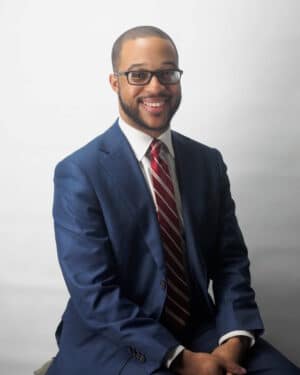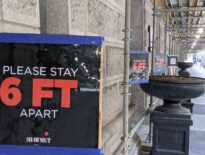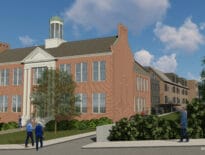Segun Idowu
Executive Director, Black Economic Council of Massachusetts
Age: 31
Industry experience: 6 years
Segun Idowu has managed to find a silver lining in the coronavirus pandemic: It has brought diverse organizations together to assist business owners during the crisis. As executive director of the Black Economic Council of Massachusetts, Idowu has worked on a variety of initiatives, from collaborations to help Black and brown business owners access the Paycheck Protection Program to a one-stop-shop (protectma.org) for personal protective equipment manufactured by Black and brown businesses.
The recent protests against racism have led to another collaboration. BECMA is leading a group of Black and Indigenous organizations in the Black Mass. Coalition, which has created a blueprint that sets targets for different sectors – private, nonprofit, philanthropy, state and local government – to achieve racial equality through capital, culture and leadership.
Q: How did the Black Mass. Coalition come about?
A: The weekend after the murder of George Floyd that all of us saw, when there were protests across the country, we were consumed by uprising and righteous indignation, I would say. Throughout that weekend, I don’t think there was a Black person in the country that did not get a phone call or email or text or direct message from some white friend or colleague asking, “What should we be doing so that we don’t ever experience this again.” I have to say this was the first time that I’ve seen that white people across the board, no matter their politics or their background, would all agree that what we saw happen in Minneapolis was murder, was a travesty and should never happen.
We thought it was very important that we partner with those in the Indigenous community because Black people are not the only group of people in the country that have serious objections to the system of white supremacy here and have not been the only one injured by that. We thought it was important that our communities come together in the push for redressing this history of repression.
We decided that rather than be selfish and say, “Here’s what BECMA needs and how we can address the business community,” we felt it was an opportunity to bring a diverse and a broad coalition of Black–led organizations together across sectors to think through how can we put in one document all of the solutions that we’ve been pushing for decades in order to say to the white community in various sectors, “Here is the path forward; this is what we’ve been saying for X amount of years.”
Q: How did you arrive at the targets?
A: The numbers were borne out of conversation, and what we believe and know are reasonable figures, especially compared to studies that say we should be pushing for a lot more. What we are optimistic about is that we have been met with a spirit of collaboration as opposed to being outright rejected. We are having conversations in the private sector and in the other sectors, so we’re looking forward by the end of the summer, if not the fall, to have things to share with the public about our progress on reaching some of these goals.
Q: How do banks fit into this blueprint?
A: Banks play a big role in investing in the Reconstruction and Rehabilitation Fund. The $1 billion fund is not a grant fund. This is meant to be a reinvestment fund, something that is going to generate revenue and replenish itself so we’re able to make continued investments in perpetuity. It’s something that is meant to do much more than what we’ve seen funds like Mayor [Marty] Walsh’s fund do, which is simply just investing in nonprofits. We want to take a holistic approach, invest in the community overall.
When we think of African American ownership of land in this country, we owned more land in the years after slavery than we do today. That’s ridiculous. One of the reasons that we see this racial wealth gap is simply ownership. We need to own land. So, the money is to be used to own land, to build on the land, to invest in homeownership, to invest in businesses, to invest in alternative economic models and a whole host of other things.
But the nonprofit part is going to be infinitesimal compared to everything else we’re investing in. Because nonprofits – and I speak as a nonprofit – they exist to fill the gaps and failures left by the private sector and government. We are trying to solve the problem and not put a Band-Aid on it. So, we’re trying to put ourselves out of business – I’ll say that as BECMA. I don’t know if my board will like me saying that, but that’s what we’re looking to do.
Q: What other roles do banks have in the blueprint?
A: Investing in businesses, awarding contracts and the leadership piece, ensuring that Black and brown people are in the C-suite beyond being chief of diversity or equity, that they are CFOs and CEOs. Also, the board leadership as well: that there are Black and brown people on boards. It’s important that our perspectives are brought into the room, are at the table, so that equity is not something that’s tacked on at the end of initiatives and understandings, that it’s there throughout.
Q: What are some positive signs you’ve been or some frustrations you’ve had with banks in recent months?
A: Berkshire Bank has just been a phenomenal partner for us, and Eastern Bank, of course they’re known for their generosity and their stance with equity with the leadership of [Chairman and CEO] Bob [Rivers] and [President] Quincy Miller. I would say those are the two banks we have the closest partnerships with, and it’s simply because of the leadership and their vision and their mission.
I can’t say I have any grievances with other banks, but that’s simply because there hasn’t been an outreach from them to build a relationship, which could say something in and of itself. The community is continually looking at CRA, and how banks participate there. I know a few years ago [in 2017] there was a huge uproar about Santander Bank not meeting their obligation. Residents – and we stand in solidarity with them – continue to point out that banks need to more efficiently commit to their CRA obligation and to make sure that people know how these investments are being made. Currently, folks aren’t really aware how banks are doing this.
Idowu’s Five Favorite Books
- “Before the Mayflower” by Lerone Bennett Jr.
- “A People’s History of the New Boston” by Jim Vrabel
- “Where Do We Go From Here: Chaos or Community?” by Martin Luther King Jr.
- “Faces at the Bottom of the Well” by Derrick Bell
- “The Giver” by Lois Lowry




 |
| 


